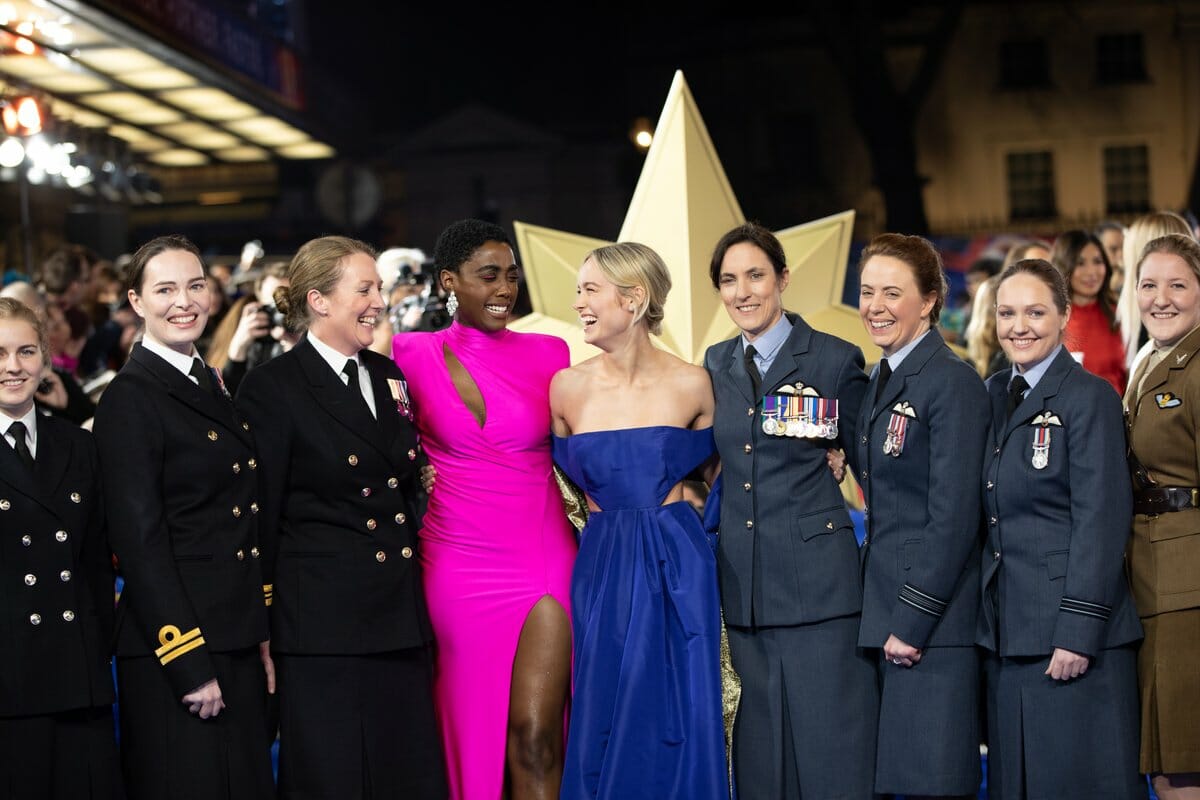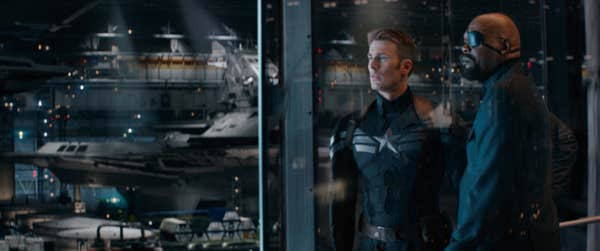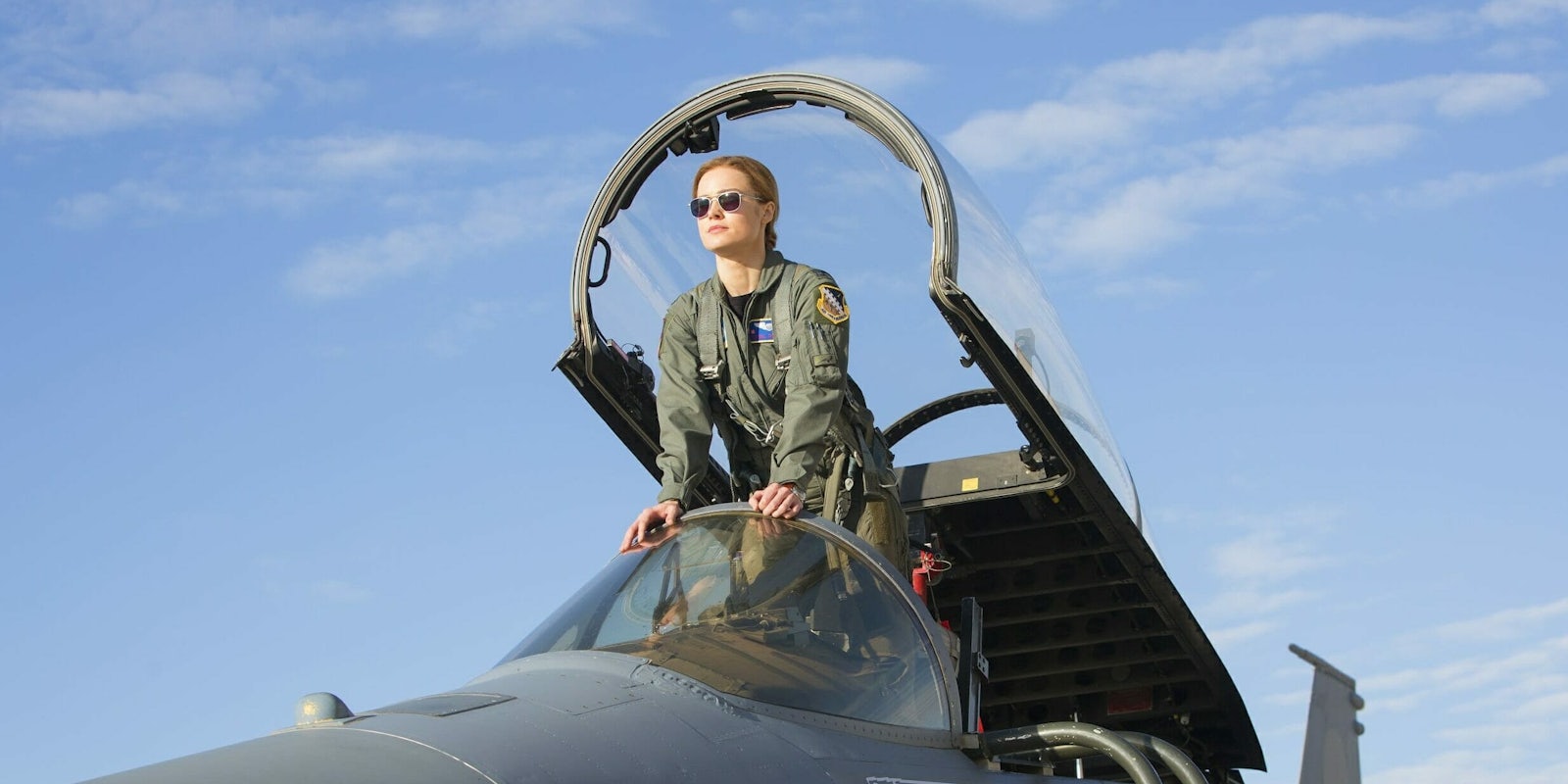Opinion
As Captain Marvel’s release date approaches, the promotional tour feels increasingly weird. Celebrating Brie Larson’s intersectional feminism while hyping up the U.S. military, it offers a pair of dueling ideas that go together like oil and water. “Joining the Air Force is so cool and feminist!” the Captain Marvel ads seem to say. To which I ask: Wait, the same Air Force that’s controlled by President Donald Trump?
It’s not unusual for Hollywood action movies to focus on military heroes and many receive direct input from the Pentagon. Between 1911 and 2017, more than 800 movies and 1,100 TV shows were supported by the Department of Defense, including Iron Man and Transformers. The CIA famously had a hand in making Zero Dark Thirty, encouraging the idea that torture is an effective intelligence-gathering tool. Top Gun is the quintessential example, though.
As the ultimate daredevil pilot movie, Top Gun benefited from extensive Pentagon input (including what the Washington Post described as “meticulous line edits”) to portray Navy pilots in a positive light, boosting Naval Aviator recruitment by 500 percent. In fact, the Navy actually set up recruitment stalls in movie theaters. And right now, Captain Marvel feels like Top Gun for 21st-century women.

Military news blog Task & Purpose compared Captain Marvel trailers to recruitment ads, linking Carol Danvers’ empowerment with her military service. And while the Air Force can’t openly say the movie is a recruitment tool, an Air Force representative told Task & Purpose that they had a “partnership” with the filmmakers to make sure Danvers was “accurate and authentic,” with the aim of creating an Air Force heroine who would be positively received. With enlistment numbers dwindling, the armed services need new ways to attract young recruits.
Are Marvel movies military propaganda?
The Marvel franchise offers a surprisingly nuanced attitude to the politics of war. Iron Man focuses on the commercial side of the military-industrial complex, with Tony Stark shutting down the weapons manufacturing wing of Stark Industries. Meanwhile, Captain America movies have a downright anti-establishment attitude.
The first movie sees Steve Rogers volunteer to fight in WWII, but the Army only accepts him as a test subject for medical experiments. (Decades later, similar experiments create the Hulk in a film where the villain is an Army general.) As Captain America, Rogers’ first mission is an awkward propaganda tour which real soldiers find insultingly facile. His heroic journey only begins after he disobeys orders to rescue a friend, recruiting a team that ignores the racial segregation rules of the time.

Set in the present day, Captain America: The Winter Soldier is much edgier. The plot hinges on a surveillance system, revealing that the fascist organization HYDRA has infiltrated the U.S. government. This twist highlights the moral ambiguity of the American intelligence services. Rogers is shocked to learn that the U.S. government spies on its own citizens and hired one of his old Nazi enemies as part of Operation Paperclip. So while the MCU includes military heroes like Rogers, Sam Wilson, and James Rhodes, its big-picture view is quite critical. The Winter Soldier ends with Cap taking S.H.I.E.L.D. down from within, and by Infinity War, he’s an international fugitive.
Judging by the trailers, Captain Marvel has a more celebratory attitude to its hero’s military roots. Danvers’ earthbound origin story is a feminist version of Top Gun, with Danvers as a badass pilot who overcomes sexist expectations and meets her best friend during training. Some of the teasers do look like recruitment ads aimed at girls, and the promotional materials are full of Air Force shout-outs like Larson’s pilot training and uniformed officers attending the premiere.
Learning how to fly. pic.twitter.com/D7ivzXJOHs
— Brie Larson (@brielarson) January 23, 2018
Disney is explicitly marketing this film with a feminist angle that’s helped by Larson’s progressive image. We want to root for Larson’s activism and Danvers’ role as an inspirational heroine. But it’s a bad idea to view Captain Marvel’s military content with an uncritical eye.
In reality, Air Force recruits are more likely to pilot drones than fighter jets and may be deployed to the moral quagmire of longterm wars in the Middle East. And that’s before we get into the transgender ban, shockingly high rates of sexual assault, and a commander-in-chief with a well-documented history of sexism.
The problem is, propaganda still works. We know intellectually that Top Gun is a bombastic Hollywood interpretation of an elite, specialized job. However, that didn’t stop people from enlisting by the boatload because they thought Cruise looked cool. It’s hard to separate the things we love (Larson can push a Jeep up a hill! Larson campaigns for diversity in Hollywood!) from things that should be viewed more critically. Especially when Marvel fans love to conflate actors with their on-screen roles.
As someone who loves superhero movies and is keen to see more with female leads, I’m sure I’ll enjoy this one. It just seems like an important opportunity for some nuanced pop culture literacy. Disney is going to make a ton of money off Captain Marvel’s feminist credentials and we should look closely at who else stands to benefit.
READ MORE:


